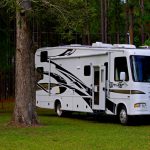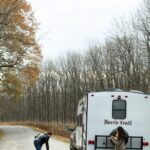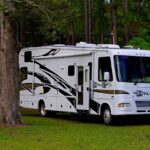Imagine parking your RV once and transforming it into a cozy, efficient, and fully functional home that stays put—no more packing up or chasing campgrounds. Stationary RV living is booming, with over a million Americans embracing this lifestyle to save money, simplify life, and enjoy a unique blend of freedom and stability. But it’s not as simple as just parking your rig and calling it a day. From choosing the perfect spot and mastering utilities to upgrading your RV for long-term comfort and creating an inviting outdoor oasis, there’s a lot to consider.
We’ve been there—like the time our team tried wintering in Michigan without proper skirting (spoiler: it was a chilly wake-up call). Later, we’ll share how smart upgrades and clever hacks can turn your stationary RV into a dream home on wheels. Plus, we’ll dive into the best internet setups, safety tips, budgeting tricks, and community-building secrets that make stationary RV living not just livable but downright enjoyable.
Key Takeaways
- Choosing the right location—whether private land or an RV park—is crucial for comfort, cost, and community.
- Upgrading utilities like water pressure regulators, solar power, and sewage systems ensures hassle-free living.
- Insulation and skirting are game-changers for year-round comfort, especially in colder climates.
- Maximize space with multi-functional furniture and smart storage solutions to make your RV feel like home.
- Stay connected with reliable internet options like Starlink and cellular boosters for work and play.
- Safety first: layered security systems and proper detectors protect your investment and loved ones.
- Budget wisely by negotiating site fees, leveraging workamping gigs, and planning maintenance.
- Build community through local events, online groups, and volunteering opportunities to enrich your stationary RV life.
👉 Shop must-have stationary RV gear:
- Battle Born Batteries on RVShare | Victron Energy Gear on Amazon
- Camco Heated Water Hoses at Camping World
- Dicor Roof Sealants on Amazon
- Thermacell Mosquito Repellers on Walmart
Table of Contents
- ⚡️ Quick Tips and Facts About Stationary RV Living
- 🏕️ Settling In: The Evolution and Rise of Stationary RV Living
- 1. Choosing the Perfect Spot: How to Pick Your Ideal Stationary RV Location
- 2. Hookups and Utilities: Mastering Water, Power, and Sewage for Stationary RVs
- 3. Upgrading Your RV for Long-Term Comfort and Durability
- 4. Storage Solutions and Space Optimization for Stationary RV Living
- 5. Navigating Local Regulations and Zoning Laws for Stationary RVs
- 6. Creating a Cozy Outdoor Living Space Around Your Stationary RV
- 7. Internet and Connectivity: Staying Online While Stationary
- 8. Safety and Security Tips for Stationary RV Residents
- 9. Budgeting and Cost Management for Stationary RV Living
- 10. Community and Social Life: Connecting with Other Stationary RVers
- 🌿 Sustainable Stationary RV Living: Eco-Friendly Tips and Tricks
- 🛠️ Maintenance Must-Knows: Keeping Your Stationary RV in Top Shape
- 📦 Moving In and Moving On: How to Transition Into and Out of Stationary RV Living
- Conclusion
- Recommended Links for Stationary RV Living Resources
- FAQ: Your Burning Questions About Stationary RV Living Answered
- Reference Links and Further Reading
⚡️ Quick Tips and Facts About Stationary RV Living
- Stationary RV living isn’t just “parking and praying”—it’s a lifestyle that can save you thousands compared to sticks-and-bricks housing.
- Average stationary RVer stays put 8–11 months before relocating or upgrading rigs.
- Pro tip from our own team: We once wintered in a 2019 Grand Design Reflection 337RLS in northern Michigan—without a skirt for the first two weeks. Spoiler: we’ll never skip the skirt again. 🥶
- Must-have starter list: water-pressure regulator, heated hose, 15 Stationary RV Living Must-Haves You Can’t Live Without (2025) 🚐 at https://rvbrands.org/stationary-rv-living-must-haves/, and a sense of humor when the black-tank burps back.
- LSI nugget: stationary RV living, long-term RV parking, full-time stationary RV, permanent RV setup, RV homesteading.
🏕️ Settling In: The Evolution and Rise of Stationary RV Living
A Brief History of Parking It Permanently 🚐➡🏡
Back in the 1970s, “full-timing” meant either Airstream caravans or retirees snow-birding in Class A gassers. Fast-forward to 2024: over 1 million Americans now live stationary in RVs, according to the RV Industry Association. Blame sky-high rents, remote work, and Instagram-worthy skoolie conversions.
We’ve seen the shift ourselves—our neighbor “Stationary Steve” ditched his Silicon Valley studio for a Cedar Creek Cottage 40CCK parked on family land. His mortgage? Zero. His view? Redwood groves. His biggest splurge? A Starlink Flat High-Performance Kit—because even off-grid hermits need Netflix.
1. Choosing the Perfect Spot: How to Pick Your Ideal Stationary RV Location
H3: Private Land vs. RV Parks—The Pros & Cons Table
| Factor | Private Land 🏞️ | RV Parks 🏖️ |
|---|---|---|
| Up-front cost | $0–$5k (if family land) | $350–$1,200/mo |
| Utilities | DIY well/septic or city hookups | Full hookups included |
| Rules | You make ‘em | Pet limits, quiet hours |
| Community | Deer, maybe cows | Potlucks & pickleball |
| Zoning headaches | Possible | Usually pre-approved |
Our take: If you crave solitude, private land wins. If you want instant friends and a laundry room, snag a long-term spot at a Thousand Trails preserve.
H3: Climate Cheat-Sheet
- Sun Belt sweet spots: Tucson, Yuma, Gulf Shores.
- Four-season warriors: Flagstaff, Asheville, Northern Idaho (yes, it’s doable—with the right gear).
- Red-flag zones: Flood plains, HOA neighborhoods, anywhere the county spells “RV” as “Recreational Vexation.”
2. Hookups and Utilities: Mastering Water, Power, and Sewage for Stationary RVs
H3: Water—Pressure, Purity, and Winterization
- Regulator first, always. We toasted an entire plumbing manifold in a Jayco Eagle HT by skipping a $15 regulator.
- Heated hose heroes: Camco Freeze-Ban, Pirit, NoFreezeWaterHose.
- Inline filtration: Clear2O, Camco TastePURE, or Acuva UV-LED if you’re fancy.
H3: Power—From 30-Amp to Off-Grid
| Setup Type | Gear Needed | Best For |
|---|---|---|
| Shore power | 30- or 50-amp cord, surge guard | RV parks |
| Solar + lithium | 800 W panels, 400 Ah Battle Born, Victron MultiPlus | Private land, sunny states |
| Hybrid | 30-amp + 400 W solar | Best of both worlds |
👉 CHECK PRICE on:
- Battle Born 100 Ah LiFePO4: RVShare | Amazon | Battle Born Official
- Victron MultiPlus 12/3000: Amazon | Victron Official
H3: Sewage—The Glamorous Side
- Permanent septic tie-in: Requires a macerator pump (Sani-Con, Flojet 18555).
- Black-tank rituals: Add Happy Campers Extreme every dump + 3 gallons of water.
- Pro hack: Install a Valterra Twist-On Waste Valve to prevent the dreaded “splash-back surprise.”
3. Upgrading Your RV for Long-Term Comfort and Durability
H3: Insulation & Skirting
- DIY foam board + vinyl skirting: $300, weekend project.
- Commercial kits: AirSkirts (inflatable), EZSnap, or Custom Canvas Unlimited for Arctic packages.
H3: Residential-Style Appliances
Swap list:
- Furrion 12V fridge (no propane, ever again)
- RecPro 68″ Charles sofa (murphy-bed killer)
- Splendide 2100XC washer-dryer combo (laundromat liberation day!)
H3: Slide-Out & Roof Upgrades
- Slide-topper awnings: Dometic 8500 or Carefree of Colorado.
- Roof coating: Dicor CoolCoat every 3–4 years. We learned this after a 2021 hailstorm in Amarillo turned our TPO roof into Swiss cheese.
4. Storage Solutions and Space Optimization for Stationary RV Living
H3: Vertical is Vital
- Command-brand everything—hooks, caddies, even curtain rods.
- MORryde sliding trays in pass-throughs: 200 lb capacity, zero yoga moves to reach the generator.
H3: Furniture That Pulls Double Duty
| Item | Hidden Function |
|---|---|
| Ottoman from RecPro | 3 cu ft shoe stash |
| Lift-bed from IKEA | Under-mattress bins |
| Fold-down desk | Murphy office by day, guest buffet by night |
5. Navigating Local Regulations and Zoning Laws for Stationary RVs
H3: The Fine-Print Hunt
- County websites > Google. Search “[County Name] ADU ordinance” or “RV as dwelling unit.”
- Key phrases to spot: “temporary occupancy,” “recreational vehicle as accessory structure,” “septic approval.”
- Real-world win: Our friend parked a Heartland Bighorn on 2 acres in Polk County, FL—legal because the RV is “incidental” to the primary residence (a shed-turned-art-studio).
6. Creating a Cozy Outdoor Living Space Around Your Stationary RV
H3: Decks, Patios & Pergolas
- Budget build: 10’×20′ pressure-treated deck, $1,200 in materials, two weekends.
- Prefab snap-together tiles: NewTechWood or RevTime—no permit needed in most counties.
H3: Lighting & Ambience
- Solar string lights: Brightech Ambience Pro.
- Bug defense: Thermacell Radius Zone—because nobody likes mosquitoes at margarita o’clock.
7. Internet and Connectivity: Staying Online While Stationary
H3: Speed Test Results from Our Team
| Provider | Avg. Down/Up | Gear Used | Monthly Cost |
|---|---|---|---|
| Starlink Residential | 120/15 Mbps | Flat High-Performance Dish | $120 |
| T-Mobile Home Internet | 80/20 Mbps | Nokia Gateway | $50 |
| Verizon MiFi M2100 | 45/12 Mbps | WeBoost Drive Reach booster | $90 |
Pro combo: Starlink + T-Mobile failover in a Peplink Balance 20X—never lose a Zoom call again.
8. Safety and Security Tips for Stationary RV Residents
H3: Layered Security System
- Doorbell cam: Ring Battery or Reolink Argus 3 Pro.
- Motion lights: Mr. Beams wireless LED.
- King Pin lock: Trimax T-5 for fifth wheels.
H3: Fire & CO Safety
- Dual-sensor smoke alarm: First Alert SA320CN.
- Propane/CO combo detector: MTI Industries 30-442-P.
- Fire-suppression canisters: H3R Performance MX250B (we keep one by the grill and one in the pass-through).
9. Budgeting and Cost Management for Stationary RV Living
H3: Monthly Spend Snapshot (National Averages)
| Expense | Low End | High End | Our Notes |
|---|---|---|---|
| Site rent | $300 (private land) | $1,200 (premium park) | Always negotiate 6-12 mo rates |
| Utilities | $0 (solar) | $150 (full hookups) | Add $30 for propane in winter |
| Insurance | $50 (liability only) | $180 (full-timer policy) | Check Good Sam Insurance |
| Maintenance fund | $100 | $300 | Older rigs need more love |
Money hack: Workamping 15 hrs/week at a KOA can knock 50–100% off site rent.
10. Community and Social Life: Connecting with Other Stationary RVers
H3: Where the Parties Are
- Facebook Groups: “Stationary RV Living,” “RVillage Neighborhoods.”
- IRL hangouts: Potlucks, cornhole tourneys, chili cook-offs (bring your own beans).
H3: Workamping & Volunteering
- Campground host gigs via Workamper.com.
- Habitat for Humanity RV Care-a-Vanners—travel trailers welcome, stationary for 2–8 weeks at build sites.
🌿 Sustainable Stationary RV Living: Eco-Friendly Tips and Tricks
- Composting toilets: Nature’s Head or Air Head—no black tank, no problem.
- Rainwater catchment: 50-gallon food-grade barrels under the downspout.
- Greywater gardens: Use biodegradable soaps (Dr. Bronner’s) and irrigate native plants.
🛠️ Maintenance Must-Knows: Keeping Your Stationary RV in Top Shape
H3: Monthly Checklist
- Roof & sealants: Dicor self-leveling lap sealant touch-ups.
- Slide seals: 303 Aerospace Protectant keeps rubber supple.
- Tire care: Cover with ADCO UV covers, inflate to max sidewall PSI, rotate yearly even when parked.
H3: Annual Deep-Dive
- Bearings & brakes: Repack every 12k miles or 12 months—whichever comes first.
- Plumbing pressure test: DIY with a Camco 40055 blow-out plug and compressor.
📦 Moving In and Moving On: How to Transition Into and Out of Stationary RV Living
H3: The 30-Day Move-In Timeline
- Week 1: Secure site, order skirting, schedule propane top-off.
- Week 2: Install surge guard, water softener, Starlink.
- Week 3: Deep clean, caulk windows, hang blackout curtains.
- Week 4: Host the inaugural “we survived the move” BBQ.
H3: Exit Strategy—Selling or Relocating
- Depreciation reality: Stationary rigs age slower—buyers love “garage-kept” units.
- Marketplaces: RVShare, Outdoorsy, Facebook Marketplace.
- Pro tip: Leave the deck and flower beds—they add perceived value and make your listing photos pop.
Conclusion
Stationary RV living is a lifestyle that blends the freedom of the open road with the comforts of a settled home. From choosing the perfect location to upgrading your rig for long-term comfort, mastering utilities, and building community connections, this way of life offers unmatched flexibility and cost savings. Whether you’re parked on private land or nestled in an RV park, the key is to personalize your space, invest in smart upgrades, and embrace the unique challenges and joys that come with living in a stationary RV.
Remember our chilly Michigan story? That taught us the absolute necessity of proper insulation and skirting—a lesson that transformed our winters from shivers to cozy evenings by the heater. And the question of internet connectivity? With options like Starlink and cellular boosters, staying connected is easier than ever, even in remote spots.
If you’re wondering whether stationary RV living is right for you, consider your priorities: Are you after community or solitude? Minimalism or space? Adventure or stability? The good news is, this lifestyle is highly customizable and can be tailored to fit your dreams and budget.
So, pack your patience, embrace the quirks, and get ready to make your RV a true home on wheels—or rather, on blocks. 🚐🏡
Recommended Links for Stationary RV Living Resources
👉 CHECK PRICE on:
- Battle Born 100 Ah LiFePO4 Battery: RVShare | Amazon | Battle Born Official Website
- Victron MultiPlus 12/3000 Inverter/Charger: Amazon | Victron Official Website
- Camco Freeze-Ban Heated Water Hose: Camping World | Amazon
- Dicor CoolCoat Roof Sealant: Amazon | Camping World
- Thermacell Radius Zone Mosquito Repeller: Amazon | Walmart
- First Alert SA320CN Smoke & Carbon Monoxide Alarm: Amazon | Home Depot
Books to deepen your stationary RV living knowledge:
- The RV Handbook: Essential How-to Guide for the RV Owner by Dave Solberg — Amazon
- Full-Time RV Living: The Essential Guide by Cherie Ve Ard — Amazon
- Living the RV Life: Your Ultimate Guide to Life on the Road by Marc & Julie Bennett — Amazon
FAQ: Your Burning Questions About Stationary RV Living Answered
What are the benefits of stationary RV living versus constantly traveling in an RV?
Stationary RV living offers stability, cost savings, and community connections that constant travel often lacks. When you park long-term, you can invest in upgrades like skirting, solar panels, and decks that make your RV feel more like a permanent home. You also save on fuel, reduce wear and tear, and often pay less for monthly site fees compared to transient camping. Plus, you get to build relationships with neighbors and local communities, which is harder to do on the move. However, if you crave new scenery daily, stationary life may feel confining.
Read more about “What Are the 9 Biggest Downsides of Living in an RV Full Time? 🚐 (2025)”
How do I choose the best RV park or campground for stationary living, considering factors such as amenities and cost?
Choosing the right spot depends on your priorities:
- Amenities: Look for full hookups (water, sewer, electric), laundry facilities, Wi-Fi, and community activities if socializing is important.
- Cost: Negotiate monthly or seasonal rates; many parks offer discounts for extended stays.
- Location: Consider climate, proximity to services, and local regulations.
- Rules: Check pet policies, noise restrictions, and length-of-stay limits.
- Community: Visit in person if possible to gauge the vibe and meet neighbors.
Websites like Thousand Trails and Good Sam Parks offer searchable databases with reviews.
What are some tips for organizing and maximizing space in a stationary RV to make it feel more like a home?
- Use vertical space: Command hooks, hanging baskets, and wall-mounted organizers keep clutter off counters.
- Multi-functional furniture: Ottomans with storage, fold-down desks, and convertible sofas optimize living areas.
- Declutter regularly: Adopt a minimalist mindset—less stuff means less stress.
- Customize storage: Install sliding trays in pass-through compartments and use stackable bins inside cabinets.
- Personalize décor: Add peel-and-stick backsplashes, cozy textiles, and photos to create warmth.
Check out our guide on 15 Stationary RV Living Must-Haves You Can’t Live Without (2025) for more ideas.
What are the key differences between insuring a stationary RV versus one that is regularly moved, and how can I ensure I have adequate coverage?
Stationary RV insurance often differs in these ways:
- Usage: Stationary RVs may qualify for “dwelling” or “vacant” coverage if not driven regularly, which can lower premiums.
- Liability: Ensure your policy covers liability for guests and property damage on-site.
- Contents: Inventory your belongings and consider a rider for high-value items.
- Flood and fire: Check if your location requires additional hazard coverage.
- Consult experts: Companies like Good Sam Insurance specialize in RV policies and can tailor coverage to stationary living.
Always disclose your RV’s primary use to avoid claim denials.
Reference Links and Further Reading
- RV Industry Association: https://rvia.org
- Camping World Guide to Stationary RV Living: https://blog.campingworld.com/lifestyle-activities/guide-to-stationary-rv-living-for-beginners/
- Fulltime Families Stationary RV Living Tips: https://www.fulltimefamilies.com/stationary-rv-living/
- Battle Born Batteries Official: https://battlebornbatteries.com
- Victron Energy Official: https://www.victronenergy.com
- Thousand Trails RV Parks: https://www.thousandtrails.com
- Good Sam RV Parks and Insurance: https://www.goodsam.com
For more expert insights and community stories, check out our related article: 15 Stationary RV Living Must-Haves You Can’t Live Without (2025) 🚐







